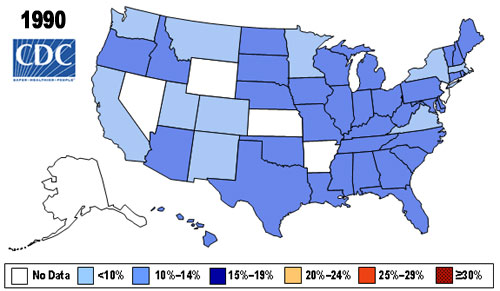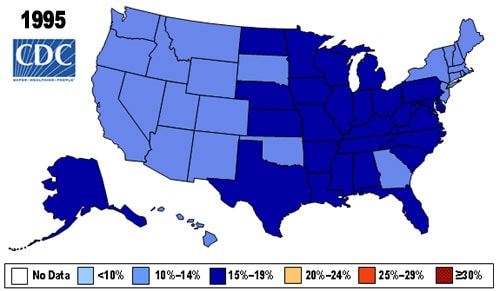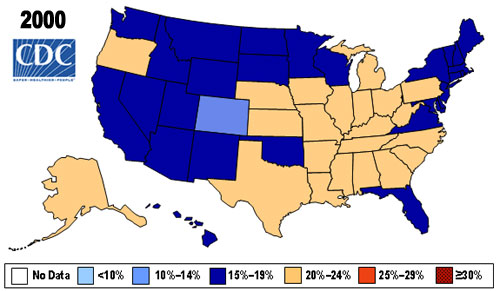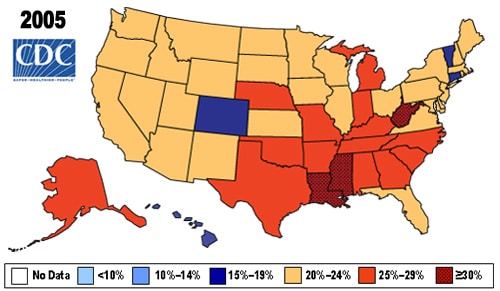Globally, the percentage of individuals with diabetes has doubled since 1980.
Now, before anyone hits the panic button, most of this is down to good things.
About 70% of the 100% increase is believed to come from the fact that around the world, those with diabetes are living longer. This is a very good thing, due to treatments being made available and new drugs coming to market.
The other 30%? That's almost all from getting fatter. Which is why, unsurprisingly, the waistline capital of the world--the US--has the highest percentage of diabetes.
| Percent of Obese (BMI > 30) in U.S. Adults (this is frightening) |
|---|
 |
| On a side note... way to go Colorado! |
This is interesting. Diabetes is a disease of success (well, the increase in diabetes, diabetes also can occur for other reasons - Type 1 diabetes rarely is related to lifestyle and health).
Think about the US 100 years ago. It was 1911, and while the world was going through a massive economic boom... the majority of US workers were farmers, and those who were not farmers were laborers and factory workers. Income distribution looked more like Saudi Arabia than the US today, the 19th amendment (women's suffrage) was still 9 years away and robber barons ruled the land. Life pretty much sucked for a lot of people, and having enough to eat was a major problem for a large percentage of the population.
Today, having enough to eat is rarely a problem. Yes, there are the homeless etc, but the majority of those are individuals who are unable to properly care for themselves (something society should take care of but instead chooses to ignore and let the police and prison system handle).
Diabetes is a problem which arises because increasingly, Americans do not do physical labor and do not have any problem accessing sufficient food. Whether they access the right food is another matter - but one which is not solved by government regulation.
What then is the solution? Of course, the best solution is a "cure for diabetes" - but more realistically, it is making it simpler to manage as a chronic condition in order to avoid the complications not managing diabetes can bring on. New drugs can do this, as can better management of care.
Interesting, it has also become apparent that a shock diet of 600 calories a day can reverse the onset of Type II diabetes in those recently diagnosed.
http://www.bbc.co.uk/news/health-13887909
The bigger question though is... is this just inevitable? People are rational actors. While a lot of people are looking at the rising obesity as a problem... ok it is a huge problem, but more accurately, people must want to be overweight. Or really, they must want to follow the lifestyle that leads them to being overweight. That lifestyle is to them what creates the most value.
Of course, I would say that this is likely because humans have a hard time valuing valuing consequences which may be far in the future, and also have a hard time valuing consequences which are rare but very negative or very positive (we tend to believe in the positive ones - lotteries and becoming athletes - and ignore the negative ones - heart attacks and... diabetes).
So then - if people are rational actors, but their valuations are wrong due to internal bias... what's to be done? In my opinion, the best bet would be to assume they are acting rationally, but try and educate the public about the reality of the costs... more or less the road we are on now. However, I would also push individuals to bear the economic costs of their decisions - particularly healthcare costs.






Comments
Post a Comment